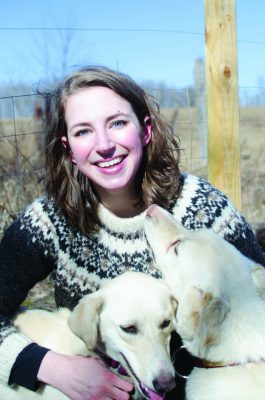These are some things that can happen on a dogsled run: You can get lost in the woods. You can crash into a rock and break your sled (or your bones). You can encounter a downed tree, or thin ice, or pass into a sudden blizzard. You can meet a wolf or a bear or a moose. You can have problems with equipment, problems with weather, problems with human-animal communication. The dogs love to run, but they love it so much that they’ll leave you in the wilderness and joyrun for hours if you ever let go of the sled.
I’ve spent much of my life chasing a sport that terrifies me. I grew up in hot California, where even as a child I dreamed about the north, and as soon as I could I moved to the Arctic in hopes of becoming one of my own heroes. It didn’t matter that I was scared of physical danger: the Arctic, I was sure, would fix me.
But what I found, first as a student in Norway and then as a dogsled guide in Alaska, was the opposite: as a young transplant to a frontier that celebrated hard masculinity, I became hyper-aware of the ways that I didn’t fit in, and how my heart raced from terror rather than excitement as my dogs sped down the trail. I made a lot of great friends, but I also endured derision: male mushers sometimes made fun of my high voice, saying the dogs would never listen to me, or else made predictions about how quickly I would fail. Their words stung because I could never be confident that they weren’t true: when I measured my courage against the brave folks around me, I fell short time and again. Finally, after ending a relationship with an abusive fellow musher, I moved back south, concluding that I was just not cut out for the life I’d dreamed about.
That was what I told myself for five years.
I was still telling myself that when I met my partner in Iowa, where we were both in graduate school. He had worked as a horse wrangler, and kept his horse at a friend’s farm just outside of town, where we spent quiet evenings riding bareback up and down a gravel road. I fell in love with his strength and gentleness, his ease on horseback. Two years later I moved with him to his farm in northern Wisconsin.
For the first time in my life, I was starting to settle down. And not only that, but somewhere cold! The Wisconsin winters thrilled me, and so did the Northwoods that extended—forever, it seemed—from the field behind our log home. I spent that first winter cross-country skiing and skating on frozen lakes, trying to be outside as much as possible. And then I got a note from an old co-worker, a dogsledder. He was selling six young huskies and wondered if I might be interested.

Of course I was interested. I was born interested. And now here I was, in a place that cancelled out my excuses: I had an animal-loving partner, and plenty of land, and a network of trails just outside my door. I also had no one watching me, no one to compare myself against. It would just be me and the dogs, learning about the woods and each other. When I first brought them home, I hardly came inside for days. My partner had to talk me out of spending nights in his vegetable garden, where we’d erected a temporary sled dog village. The dogs were my first thought each morning, and their howls lulled me to sleep.
Around the same time, I started working on my book, Welcome to the Goddamn Ice Cube. I’d originally conceived it as an adventure story, but no matter how I wrote it, the narrative fell flat. That is, until I started writing explicitly about fear, and isolation, and sexual violence—elements of my arctic experience that I never thought I could explore on the page, because they proved that I’d never been cut out for the north in the first place. The book became a tool to reconcile the ways that gender and queerness played out on the frontier, how a stark and wild landscape brought universal tensions to a head. It became a way to make sense of my experience, to carve space for a gendered story with layers of danger beyond just the cold.
By the time I finished writing, I had come to realize, for the first time, that my experience in the arctic was not less valid than the experiences of those I so admired—it was just less often articulated. This story, this adventure, belonged to me.
Over the past two years, my team has grown from six to 21 huskies, and this past winter we covered almost 1,500 miles of trail. I’m no braver than I was before—my heart still races each time I step on the sled—but I have, I think, grown in faith. Faith in the dogs and in my own ability to meet challenges as they come. Faith that both the worst and the best moments will pass. Together we’ve slept curled up in snowstorms, crossed ice bridges, navigated by starlight, loped alongside a black wolf. And more, and more. The longer we run, the less I ever want it to end.
























0 Comments